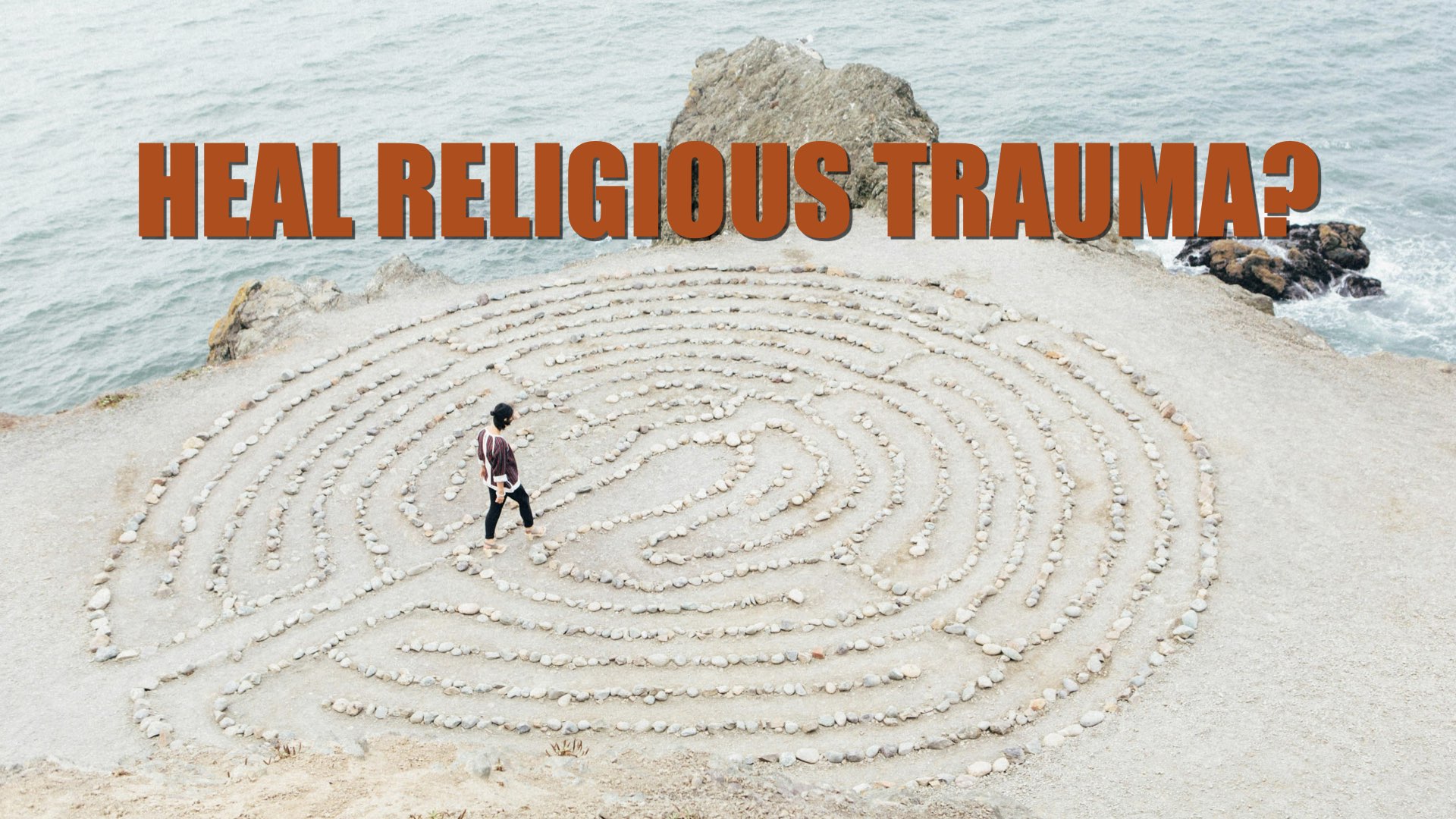Religious Trauma Syndrome is a complex and often deeply personal struggle. For those affected, the impact can be profound, influencing mental health, personal identity, relationships, and one’s sense of self-worth. Here we explore how to begin the process of healing from RTS, providing practical ways to rebuild a life grounded in personal authenticity and inner peace. Whether you’re just beginning to question your past experiences or have been on the path to recovery for some time, this guide offers a compassionate framework to empower and support you.
The journey to healing from religious trauma is not linear, it’s a gradual process, often with ups and downs. Taking the first steps can feel overwhelming. While therapy and support networks are foundational tools, there are also small, manageable steps you can start today to foster a sense of safety, self-understanding, and gradual healing. By incorporating small, daily practices you’re creating a solid foundation for healing. Every step you take—no matter how small—is a meaningful move toward reclaiming your sense of self, security, and personal freedom. Here are some practical steps you can take to gently begin your healing journey. These practices don’t require external resources, and many can be integrated into your daily routine.
A room of one’s own – create a personal space
When dealing with trauma, creating a physical and/or mental space that feels entirely yours is essential. A “safe space” helps you decompress, self-reflect, and feel grounded. It serves as a sanctuary where one can feel safe, free from external expectations or judgment. It’s a place to process emotions, reflect, and reconnect with one’s inner self. In the context of healing, a personal space provides the physical and emotional freedom needed to experiment with new ways of thinking, feeling, and being. It becomes a nurturing environment for self-discovery, where one can engage in restorative practices like journaling, meditation, or simply resting without the pressure of others’ influence. Therefore also remember that if others share your living area, let them know this space is for you alone. Setting boundaries around your personal space is an empowering way to reclaim a sense of ownership over your environment.
Meditate
Meditation is a powerful tool for healing by fostering a sense of inner peace and self-compassion. For many who have experienced fear-based or guilt-driven teachings, reconnecting with a calm, nonjudgmental awareness can be profoundly healing. Meditation helps quiet the mind and release ingrained patterns of anxiety, allowing individuals to observe their thoughts and emotions without fear or shame. By cultivating mindfulness, survivors of religious trauma can begin to separate their authentic self from the harmful beliefs they were taught and create space for self-acceptance and healing. Regular meditation can reduce symptoms of stress, promote emotional regulation, and offer a renewed sense of spiritual connection that feels safe and affirming. A new study, published in Journal of Positive Psychology, shows that meditating for only 15 minutes can give the same health benefits as a full day of vacation.
Start a “Deprogramming” Journal
Journaling is an invaluable tool for processing your thoughts, memories, and emotions. A “deprogramming” journal is specifically for unpacking and challenging beliefs or messages that were ingrained in you by past religious experiences.
- Identify when and what: Identifying when you get triggered is a crucial step. Triggers can include specific situations, conversations, thoughts, words, or even sounds that cause a surge of fear, anxiety, or stress. By recognizing these moments, you gain insight into how your trauma still affects you today. Writing down these triggers in a journal can be incredibly empowering. It allows you to track patterns, understand the roots of your emotional reactions, and develop strategies to respond with more self-compassion. Journaling creates a safe space to explore your vulnerabilities and acknowledge the impact of your trauma, all while fostering greater self-awareness and emotional resilience.
- Identify Limiting Beliefs: Write down any beliefs that make you feel fearful, guilty, or restricted. These might include statements like, “I’m unworthy,” or “I’m not allowed to think for myself.”
- Explore Alternative Narratives: Next to each belief, write down alternative, more compassionate statements. For example, if you were taught that questioning is sinful, counter it with, “Curiosity and questioning are natural parts of being human.”
- Remember, your goal is not to “erase” your past but to understand it and then reframe it in a way that aligns with your values and empowers you.
Challenge “All-or-Nothing” Thinking Patterns
Authoritarian religious systems often instill all-or-nothing or black-and-white thinking, where everything is either good or bad, right or wrong. Healing from RTS requires developing cognitive flexibility—learning that life is complex and doesn’t fit neatly into rigid categories.
- Question Automatic Thoughts: When you catch yourself having a rigid thought, ask gentle questions like, “Is this the only way to see this situation?” or “Could there be more than one perspective?”
- Explore “Grey Areas”: Gradually allow yourself to accept the idea that life is full of uncertainty and complexity. Practice acknowledging that it’s okay not to have all the answers, especially on moral or spiritual questions.
- Celebrate Small Wins: Every time you question or adjust a rigid belief, celebrate it as a small step toward healing. Shifting from all-or-nothing thinking is challenging, but every small shift builds resilience and self-trust.
- Remember, this is not about questioning everything nor that nothing is true. It’s about having a rational, flexible and critical mind.
Education and Self-Reflection
Understanding the psychology of trauma and indoctrination can be empowering. By learning about the effects of authoritarian systems and the psychological mechanisms of control, individuals can gain perspective on their experiences. Also watch and listen to “unlearning” videos and podcasts. That will challenge what you’ve always found true, and will give you new perspectives. Embrace Personal Agency – the key is allowing yourself to find meaning on your terms. Give yourself permission to explore, adapt, or even reject certain practices. Your spiritual or secular path should feel affirming, rather than restrictive.
Experiment with Simple Acts of Self-Compassion
Religious trauma often leaves people with a harsh inner critic that makes self-kindness feel unfamiliar or even “wrong.” Starting small, practice acts of self-compassion to nurture a kinder, more supportive relationship with yourself.
- Practice Self-Soothing Statements: When negative thoughts arise, gently counter them with affirming statements like, “It’s okay to feel this way,” or “I am learning to trust myself.”
- Create a Self-Care Ritual: Choose one simple act of self-care to incorporate daily—this could be enjoying a cup of tea, taking a short walk, or reading for pleasure. This small ritual will help you establish a habit of putting your well-being first.
- Remember Self-Compassion Is a Skill: Don’t expect to become a master of self-compassion overnight. Approach each self-compassionate act as a new skill to practice, rather than something you need to perfect.
Healing from Religious Trauma: Seeking Help and Support
Recognizing religious trauma is only the first step. Healing requires time, self-compassion, and often the support of professionals trained in trauma therapy.
- Trauma-Informed Therapy: Seeking a trauma-informed therapist can be transformative for those experiencing religious trauma. Therapists skilled in treating PTSD and complex trauma can help individuals unpack and process their experiences, developing healthier emotional and cognitive patterns.
- Cognitive Behavioral Therapy (CBT): CBT is effective for addressing the thought patterns often seen in religious trauma. By challenging and reframing negative beliefs, individuals can gradually overcome ingrained feelings of shame and fear.
- Community Support: Finding communities of people who have had similar experiences can be validating and comforting. Support groups and online communities focused on religious trauma can offer a safe space for sharing and healing.



